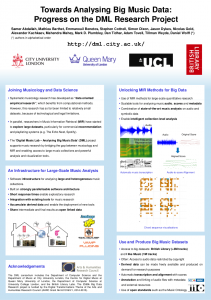Current progress on the DML project will be presented by Stephen Cottrell at the 59th annual meeting of the Society for Ethnomusicology, taking place on 13-16 November in Pittsburgh, Pennsylvania. The abstract for the talk can be found below:
Ethnomusicology, Music Information Retrieval and Big Data
The application of Music Information Retrieval (MIR) techniques to large recorded corpuses of music beyond the Western traditions, taken at face value, appears to run contrary to many of the principles which ethnomusicologists have long held dear. Culturally decontextualised, and with all the problems that attach to specific recordings serving as single instantiations of otherwise diverse musical traditions, the large-scale computerised analysis of such recordings risks appearing to return the discipline to its comparative musicology roots. Nevertheless, some studies have been undertaken over recent years as part of what is sometimes termed ‘computational ethnomusicology’. What is gained is the possibility not only of the kinds of technologically-enhanced analytical exactitude which computers can provide, but also of large-scale comparative analyses both within and across cultures. These offer, for example, the prospect of revisiting on a more scientific basis earlier debates about human universals in music making, in addition to the more usual traits of pitch or melody extraction, semantic categorisation and similar. Thus far, however, MIR studies have generally concentrated on individual recordings or small collections, which do not comfortably facilitate large-scale comparisons. This paper will review some of the latest work being undertaken in the MIR field in relation to global music traditions, and consider the problems and possibilities such approaches present. It will also report on the latest results from an ongoing government-funded UK research project – the Digital Music Lab – which seeks to apply MIR techniques to musical Big Data, specifically focused on music beyond the Western traditions.
 Recent work on instrumentation recognition that was carried out as part of the DML project was presented at the Workshop on Musical Timbre, that took place on 14th November at Télécom ParisTech, in Paris, France. The talk was entitled “Instrument transcription & instrumentation recognition”.
Recent work on instrumentation recognition that was carried out as part of the DML project was presented at the Workshop on Musical Timbre, that took place on 14th November at Télécom ParisTech, in Paris, France. The talk was entitled “Instrument transcription & instrumentation recognition”.

